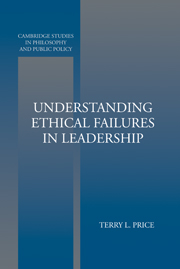Book contents
- Frontmatter
- Contents
- Acknowledgments
- Introduction
- 1 Volitional and Cognitive Accounts of Ethical Failures in Leadership
- 2 The Nature of Exception Making
- 3 Making Exceptions for Leaders
- 4 Justifying Leadership
- 5 The Ethics of Authentic Transformational Leadership
- 6 Change and Responsibility
- 7 Ignorance, History, and Moral Membership
- Works Cited
- Index
- References
Works Cited
Published online by Cambridge University Press: 06 January 2010
- Frontmatter
- Contents
- Acknowledgments
- Introduction
- 1 Volitional and Cognitive Accounts of Ethical Failures in Leadership
- 2 The Nature of Exception Making
- 3 Making Exceptions for Leaders
- 4 Justifying Leadership
- 5 The Ethics of Authentic Transformational Leadership
- 6 Change and Responsibility
- 7 Ignorance, History, and Moral Membership
- Works Cited
- Index
- References
- Type
- Chapter
- Information
- Understanding Ethical Failures in Leadership , pp. 201 - 212Publisher: Cambridge University PressPrint publication year: 2005



